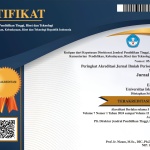The Impact of Constitutional Court Decision No. 168/PUU-XXI/2023 on The Employment Cluster in The Job Creation Law: Implications for The Use of Foreign Workers in National Strategic Projects
Abstract
The ratification of Law No. 11 of 2020 on Job Creation, using the omnibus law concept, marks a new beginning in the legislative process, including in the employment sectors. This law consists of 11 clusters, one of which is the Employment cluster. While the Job Creation Law has undergone changes due to judicial review, it has also faced significant debate and controversy. The omnibus concept aims to simplify, synchronize, and streamline regulations that hinder the goals of job creation and investment in the real sector. National strategic projects supported by the Job Creation Law have led to an influx of foreign workers. If the foreign worker licensing process is simplified, especially to support these national strategic projects, it must still consider that the positions filled by foreign workers cannot be filled by Indonesian workers. The debate and rejection of the Job Creation Law, culminating in the filing of a judicial review request to the Constitutional Court regarding the employment cluster (Decision 168/PUU-XXI/2023), suggests that the omnibus law concept may not be the appropriate approach for the formation of Employment Law, as there are norms that conflict with the 1945 Constitution of the Republic of Indonesia.
Keywords
Full Text:
PDFReferences
Al’afghani, M. M. (2021). Konsep Regulasi Berbasis Risiko: Telaah Kritis dalam Penerapannya pada Undang-Undang Cipta Kerja Risk Based Regulation: Critique to Its Adoption in the Job. Jurnal Konstitusi, 18, 68.
Anggono, B. D., & Firdaus, F. R. (2020a). Omnibus law in Indonesia: A comparison to the United States and Ireland. Lentera Hukum, 7, 319.
Anggono, B. D., & Firdaus, F. R. (2020b). Omnibus law in Indonesia: A comparison to the United States and Ireland. Lentera Hukum, 7, 319.
Annasa Rizki Kamalina. (2024). Proyek PSN Serap 2,71 Juta Tenaga Kerja sepanjang 2016-2023.
Arfyana Citra Rahayu, & Herlina Kartika Dewi. (2022). Kemenaker: Tenaga Kerja Asing dari China Paling Banyak Bekerja di Morowali. KONTAN.CO.ID.
Arizona, Y. (2024). Legal Policy of President Joko Widodo and the Independence of Constitutional Court: Politik Legislasi Presiden Joko Widodo dan Independensi Mahkamah Konstitusi. Jurnal Konstitusi, 21(1), 35–61.
Dewinagara, T. B., Handayani, I. G. A. K. R., & Purwadi, H. (2022a). The Omnibus Law concept in the Job Creation Law and the legal consequences for limited liability companies. Sasi, 28(2), 323–335.
Dewinagara, T. B., Handayani, I. G. A. K. R., & Purwadi, H. (2022b). The Omnibus Law concept in the Job Creation Law and the legal consequences for limited liability companies. Sasi, 28(2), 323–335.
Fahrurozi Muhammad. (2022). Manifesto Simplifikasi Regulasi Dan Persetujuan Presiden Terhadap Peraturan Menteri/Kepala Lembaga: Studi Terhadap Peraturan Presiden Nomor 68 Tahun 2021 Tentang Pemberian Persetujuan Presiden Terhadap Rancangan Peraturan Menteri/Kepala Lembaga (Regulation Simplification Manifest And President’s Approval Of Ministerial/Head Of Agency Regulation: Study On Presidential Regulation No. 68 Of 2021 On Presidential Approval Issuance Of Ministerial/Head Of Agency Regulation). Fakultas Hukum Universitas Indonesia. https://doi.org/10.1787/9789264029798-en
Handayani, I. G. A. K. R., & Karjoko, L. (2021). Dysfunction of foreign worker employment regulation to prevent xenophobia. International Conference on Environmental and Energy Policy (ICEEP 2021), 14–17.
Prosser, T. (1997). Law and the Regulators. Oxford University Press.
Siregar, A. A. (2022). Legal Studies on Omnibus Law Issues in Indonesia. International Asia Of Law and Money Laundering (IAML), 1(4), 270–278.
Suriadinata, V. (2019). Penyusunan undang-undang di bidang investasi: Kajian pembentukan omnibus law di Indonesia. Refleksi Hukum: Jurnal Ilmu Hukum, 4(1), 115–132.
DOI: https://dx.doi.org/10.30659/jdh.v8i2.44863
Refbacks
- There are currently no refbacks.
View My Stats

This work is licensed under a Creative Commons Attribution 4.0 International License.
Jurnal Daulat Hukum has been indexed in:

